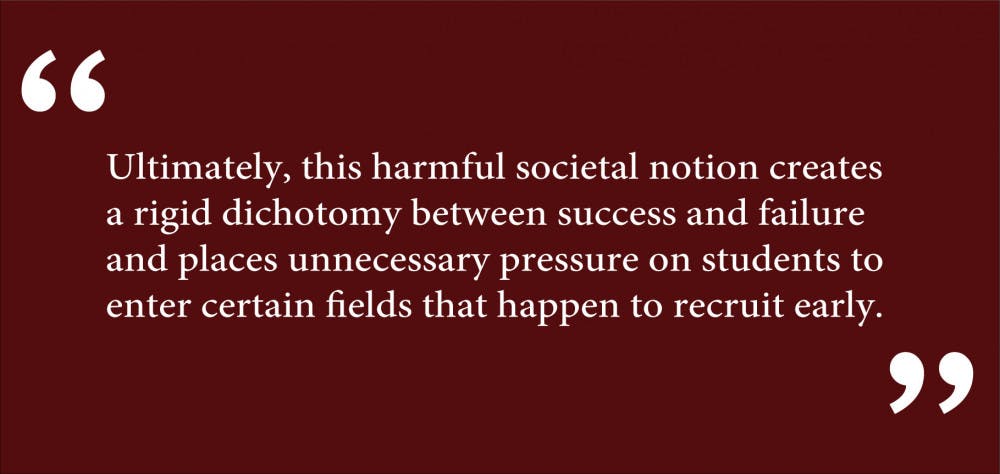As the fall semester heats up, it has become common to see students running to interviews in formal attire, practicing consulting cases in the basement of the Sciences Library and attending various recruitment events on campus. We all know what this means: Job recruiting is in full swing — and for many fields, it has started this year earlier than ever.
Over the years, companies have increasingly intensified campus recruiting efforts. Consulting, finance and technology companies begin recruiting in the fall, subjecting interested students to a rigorous and lengthy application process as early as September. And companies in other fields tend to recruit more heavily in the spring, but many release early applications in the fall, urging students to send in resumes months before they expect to begin work.
Given that cover letter writing and interview preparation can take hours upon hours each week, applying to jobs during the semester is a demanding process comparable to an extra class. This often forces students to sacrifice their senior year experience and forgo other campus opportunities. Many students understand this and see it as a worthy trade-off. But corporate recruiting — with all its financial, social and family pressures — puts too much pressure on students, who may not even find passion in these jobs anyhow.
Why is there so much pressure in the first place? For a start, some students face financial obligations. Many of us, myself included, will leave Brown strapped down with thousands of dollars of student loans, and, as a result, feel an urgency to secure a comfortable salary before the year ends.
But another, more avoidable reason for the growing obsession with corporate recruiting is status. At Ivy League schools, where the pressure to succeed is high, securing early career plans is often seen as a sign that a person is responsible and successful, while planning late is generally associated with failure or lack of ambition. There is also the perception that some jobs, such as those in consulting, finance and computer science, are more prestigious than others. While Brown’s student body places more emphasis on creativity and job satisfaction than students at other schools, this attitude is still widespread.
Finally, family pressure is a real, if unacknowledged, factor in our shifting career priorities. I speak from experience: I can’t describe how many times I have been to a family barbecue and had a relative say, “You go to Brown, so I guess you’ll be buying me dinner pretty soon.” Meanwhile, my parents relentlessly tell me, “All that tuition money better start paying off soon.” This type of commentary is stereotypical and unwarranted, but many students unfortunately face similar comments, propagating even more career anxiety.
Ultimately, this harmful societal notion creates a rigid dichotomy between success and failure and places unnecessary pressure on students to enter certain fields that happen to recruit early.
It also creates unnecessary competition. Under the current system, thousands of students apply to the same few positions in coveted fields, pitting them against each other to avoid the insidious concept of “falling behind.” In some ways, this very competition pressures students further because it perpetuates the idea that jobs are scarce and will get filled early. In reality, students can find hundreds of opportunities if they expand their job search outside of the most popular industries.
Of course, it is worth acknowledging that Brown students are more likely to go into careers in nonprofits or pursue other nontraditional fields than students from many of our peer schools. At the same time, far too many students are unaware of the opportunities that lie outside popular career paths. Jobs in communications and media, for example, recruit more heavily in the spring or hire on a rolling basis, yet many students don’t realize this.
And this is precisely where Brown can step in. Though promoting fall recruitment for those who are genuinely interested in these careers is important, Brown should also work toward building more awareness about alternative jobs and recruiting cycles. CareerLAB has dedicated considerable attention to promoting nonprofit careers, but more can be done to shed light on other sectors and career paths. At the end of the day, it’s crucial that students dedicate their time toward opportunities that bring them fulfillment, rather than pursuing only a few select fields based on external pressure and imperfect information.
Samantha Savello ’18 can be reached at samantha_savello@brown.edu. Please send responses to this opinion to letters@browndailyherald.com and other op-eds to opinions@browndailyherald.com.





